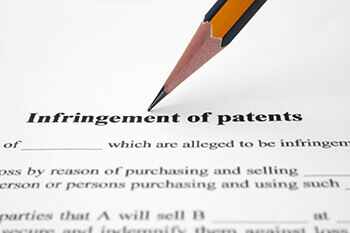Intellectual Property Law
What Damages are Available in a Patent Infringement Case?
Where a valid and enforceable patent has been infringed, the patent holder is entitled to recover at least a reasonable royalty, as well as lost profits, when applicable. Treble damages and attorneys’ fees are available in a case of willful infringement.
A reasonable royalty is calculated to reflect the amount the patent holder would have received in royalties from the defendant if the defendant had negotiated a license at the time the infringement began. The court considers many factors in calculating the exact amount, including:
- whether there are other licenses by the patent holder, or other comparable licenses, which would tend to prove an established royalty;
- the established licensing policies of the patent holder;
- the nature and scope of the license;
- the commercial relationship between the licensor and licensee;
- the profitability of the product using the license; and,
- the portion of the profits of the product that is due to infringing the patent versus profits from non-infringing elements of the product
Lost profits are the profits the patent holder would have made despite the defendant’s infringement of the patent. To recover lost profits, a patent holder must show:
- its profit margin;
- the market demand for the patented feature;
- the absence of non-infringing substitutes for the invention; and,
- that it had capacity to meet the needs of the defendant’s customers.
The infringer may have to pay treble damages (three times the actual money damages) if the defendant’s infringement was “willful.” To prove that the infringement was willful, the patent holder must show:
- the defendant knew of the patent; and,
- the defendant either copied the patent or tried to design around it.
Whether the defendant engaged in any litigation misconduct or had substantial defenses to the lawsuit may also be considered in determining willfulness.

Catherine Rajwani
Principal Attorney
PHONE: 508-393-9244
EMAIL: crajwani@harborlaw.com
Catherine Rajwani is an intellectual property and business litigation attorney.
Ms. Rajwani handles a full range of intellectual property and business issues in her practice including patent, trademark, copyright, trade secret, contract and business tort disputes. She has participated in all phases of litigation, from pre-litigation counseling through trial and appeal, in federal courts throughout the country. She is also skilled in alternative dispute resolution proceedings.
Find out more about issues in our related practice areas
Intellectual Property Law
Trademark Protection
Trade Secrets
Copyrights
Patents
Intellectual Property Law
Insights, opinions and decisions you should know about

Defend Trade Secrets Act: Two Years Later
It has been more than two years since President Obama signed the Defend Trade Secrets Act (DTSA) into law, which created a federal, private, civil cause of action for trade-secret misappropriation in which “[a]n owner of a trade secret that is misappropriated may...

Where Do You Sue for Patent Infringement? – Proper Venue Post ‘TC Heartland’
In May of 2017, the Supreme Court unanimously reversed the Federal Circuit’s 25-year-old precedent on venue for corporate defendants.[1] Venue is the proper or most convenient location for trial of a case, and is governed by state and federal statutes. The 10-page...

Cost-Effective Mechanisms for Enforcing Intellectual Property Rights
In my practice, I counsel small and midsize business clients, many of which are astute with regard to securing their intellectual property rights. They have federally registered their trademarks with the U.S. Patent and Trademark Office, secured a portfolio of patents...

How Do I Defend a Patent Lawsuit?
The Top 5 Ways to Defend Your Company in Patent Infringement Litigation You discover that your company has been sued for patent infringement. After reviewing the patent cited in the complaint, you determine that the technology described relates to your company’s...
Get in touch with us.
Learn more about how we can help.